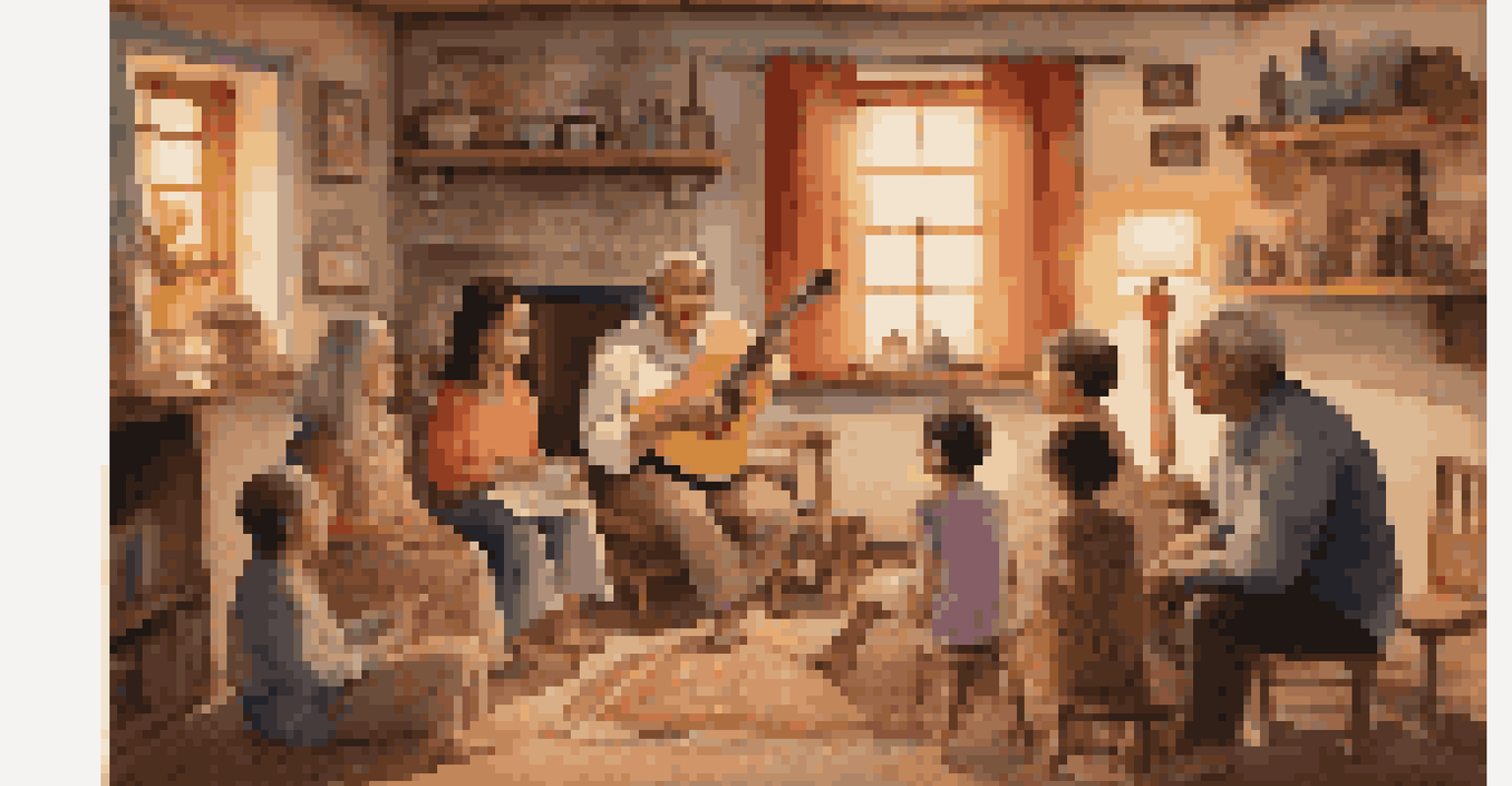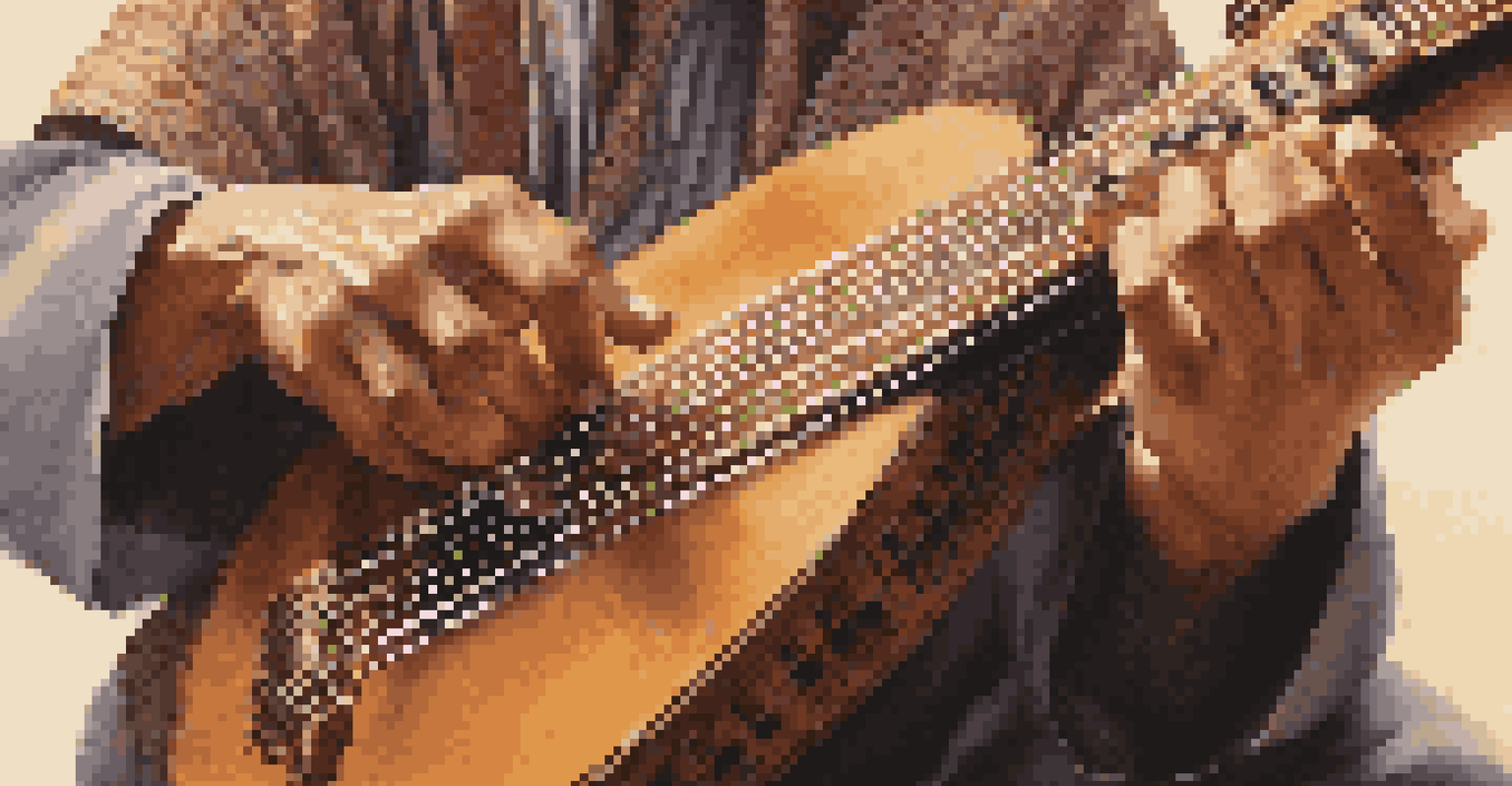Exploring the Interdependence of Music and Cultural Practices

Understanding the Role of Music in Culture
Music is often referred to as a universal language, reflecting the emotions and stories of a culture. It serves as a backdrop to significant life events, from weddings to funerals, marking important milestones and rituals. Each culture has its unique musical styles that encapsulate its history, values, and collective identity, making music a vital component of cultural expression.
Music is the shorthand of emotion.
For instance, consider the role of folk music in various cultures. It often conveys the history and traditions of a community, offering insights into their way of life. As people gather to listen or participate, they strengthen their cultural bonds, showcasing how music can unite individuals under a shared identity.
Moreover, music acts as a form of storytelling, passing down narratives that shape cultural understanding. Through lyrics and melodies, artists can express their experiences and perspectives, allowing listeners to connect with their heritage and the broader human experience.
Cultural Practices That Shape Musical Styles
Cultural practices heavily influence the types of music that emerge within a society. For example, the traditional music of the Sami people in Scandinavia is deeply tied to their reindeer herding practices, incorporating sounds that mimic nature and convey their connection to the land. This illustrates how the environment and lifestyle can shape musical expression.

In addition, social structures and customs can dictate the instruments used and the themes explored in music. For instance, in cultures with rich oral traditions, storytelling through song is prevalent, leading to unique musical forms that prioritize narrative. These practices help preserve cultural heritage while evolving with new influences.
Music as Cultural Expression
Music serves as a vital component of cultural expression, reflecting the emotions and stories of a community.
Furthermore, cultural events and celebrations often inspire specific musical genres. The rhythms of samba in Brazil, for example, are intricately linked to the country's vibrant carnival culture, showcasing how music and festivities intertwine to create a dynamic cultural experience.
The Impact of Globalization on Music and Culture
Globalization has created an interconnected world where music travels across borders, leading to fascinating cultural exchanges. While this has enriched musical landscapes, it also poses challenges to traditional forms. As artists blend styles from different cultures, the original essence of some musical genres may become diluted or transformed.
Without music, life would be a mistake.
Take hip-hop as an example; it originated in the United States but has been embraced worldwide, evolving into various local styles. In this way, globalization has enabled artists to share their cultural narratives while simultaneously adopting elements from others, resulting in a rich tapestry of sounds that reflect diverse experiences.
However, this blending can raise questions about authenticity and cultural appropriation. It's essential to recognize and respect the roots of these genres, ensuring that artists honor the cultural significance behind the music they draw inspiration from.
Music as a Tool for Cultural Preservation
In many cultures, music serves as a powerful tool for preservation, keeping traditions alive for future generations. Indigenous communities, for example, often use music to pass down their language and stories, ensuring that their cultural identity remains intact. By teaching younger generations these songs, they maintain a vital connection to their heritage.
Organizations and initiatives focused on cultural preservation often utilize music as a means to engage communities. Workshops, performances, and recording projects can help revitalize interest in traditional music, fostering a sense of pride and continuity. This not only enriches the cultural fabric but also inspires innovation within these musical forms.
Globalization's Impact on Music
Globalization fosters cultural exchanges in music, allowing for blending of styles but also raising concerns about authenticity.
Additionally, music festivals dedicated to cultural heritage play a crucial role in spotlighting traditional music. These events celebrate the diversity of cultural expressions and encourage participation, allowing audiences to appreciate the depth and richness of various musical traditions.
The Emotional Connection Between Music and Culture
Music has a unique ability to evoke emotions, often tied to specific cultural contexts. For instance, a traditional lullaby can bring feelings of comfort and nostalgia, reminding listeners of their childhood and familial bonds. This emotional connection can transcend language barriers, allowing music to resonate universally within various cultural frameworks.
Moreover, the way music is experienced can vary widely from culture to culture. In some traditions, communal singing and dancing are integral parts of social gatherings, creating a sense of belonging and shared joy. This highlights how music not only reflects cultural values but also actively participates in shaping social interactions.
The interplay of music and emotion can also be observed in times of crisis. National anthems or protest songs, for example, can galvanize communities and inspire collective action, illustrating how music can resonate deeply within a cultural consciousness during pivotal moments.
The Influence of Technology on Music and Culture
Technology has dramatically transformed the way we create and consume music, impacting cultural practices in numerous ways. The rise of digital platforms has made it easier for artists to share their work globally, leading to a more diverse musical landscape. This accessibility allows for a fusion of genres, enriching cultural exchanges and collaboration.
However, the digital age also presents challenges to traditional music forms. As mainstream music dominates streaming platforms, there is a risk that lesser-known cultural music may be overshadowed. It's crucial for listeners to seek out and support these unique musical expressions to help preserve their cultural significance.
Music Preserves Cultural Heritage
Music acts as a powerful tool for cultural preservation, helping to maintain traditions and engage future generations.
Additionally, technology plays a role in how music is taught and learned. Online resources and courses make it possible for individuals to explore different musical traditions, fostering a broader appreciation for the diverse ways music is intertwined with culture.
Celebrating Diversity Through Music and Cultural Practices
Celebrating diversity is a central theme in exploring the relationship between music and culture. Music festivals and cultural events often showcase a variety of musical traditions, allowing people to experience the richness of global cultures. This not only promotes understanding and appreciation but also fosters inclusivity within communities.
Through music, cultural barriers can be broken down, creating opportunities for dialogue and collaboration. When artists from different backgrounds come together to create, they celebrate their differences while finding common ground, resulting in innovative musical expressions that reflect a shared human experience.

Ultimately, embracing the diversity of music and cultural practices enriches our lives and broadens our perspectives. It reminds us that while our backgrounds may differ, the emotions and stories conveyed through music unite us in our humanity.